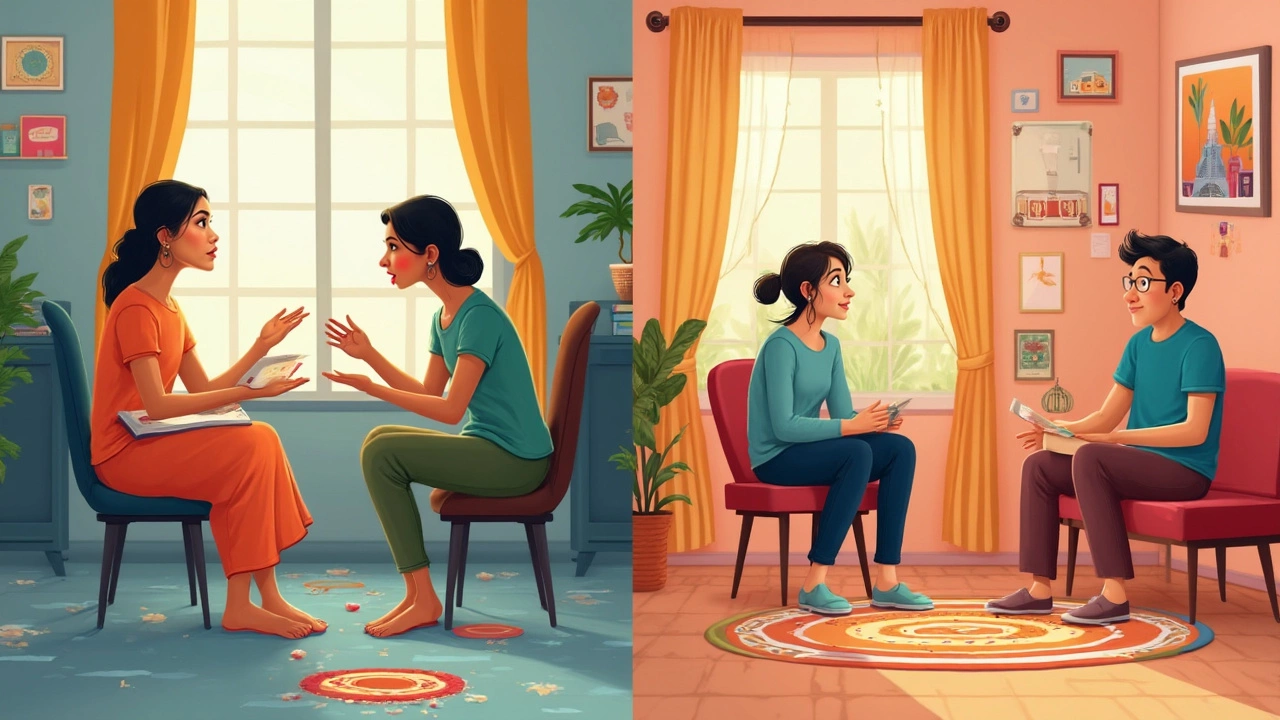
Ever googled ‘counseling vs therapy’ only to end up more confused? You’re absolutely not alone. These words get tossed around like tennis balls, and honestly, most folks use them interchangeably. But they’re not quite the same. If you’ve been circling the mental health world for your kids, partner, or even just to figure out your own stress, knowing the difference can save you time, money, and a lot of head-scratching.
Let’s cut through the jargon. Counseling usually zooms in on specific issues—think work stress, a breakup, or school worries. It’s about finding solutions and building new skills. Therapy, or psychotherapy, typically digs deeper, into patterns that might have followed you for years. It’s less about quick fixes and more about understanding yourself and your story.
I’ve been there. When my son Vihaan felt overwhelmed at school, his guidance counselor did wonders in a few sessions. On the flip side, one of my buddies needed therapy to really tackle old stuff he’d carried since childhood. Both helped; they just worked differently.
- Why People Mix Up Counseling and Therapy
- How Counseling Actually Works
- What Sets Therapy Apart
- Who Should Consider Each Option
- Tips for Finding the Right Fit
- Real Talk: Everyday Ways to Support Mental Health
Why People Mix Up Counseling and Therapy
Alright, so here’s the deal: the terms “counseling” and “therapy” get thrown around like they mean exactly the same thing because, honestly, not even professionals always keep them straight. For years, colleges put “counseling center” on their doors, even if they had therapists inside. Go to most clinics and you’ll find job titles bouncing back and forth: “counselor,” “therapist,” sometimes even “psychotherapist.” Small wonder folks feel lost!
Part of the confusion comes down to what people actually experience. When you sit and talk with someone about your problems in a comfy chair, is it any different if their card says counselor or therapist? Unless you ask, you might never know. Movies and TV barely help—they use the words pretty much as punchlines.
There’s also the way schools and workplaces label their services. “Employee Assistance Program” sessions are called counseling, even if deep life issues come up. At the same time, many therapists call what they do counseling when they’re actually digging into the roots of old patterns and traumas.
- Counselors usually address specific issues (like stress or relationship problems).
- Therapists are more likely to take on long-standing emotional struggles or mental health conditions.
- Licensing rules vary by state and country, so titles can get extra confusing.
Check out just how mixed up things can get across the US:
| Title | What They Might Do | Common Setting |
|---|---|---|
| School Counselor | Student guidance, stress support | Schools |
| Mental Health Counselor | Talk therapy, coping strategies | Clinics, private practice |
| Marriage and Family Therapist | Relationship therapy, family issues | Private practice |
| Licensed Clinical Social Worker | Therapy, case management | Hospitals, community agencies |
Bottom line: most places just want people to ask for help when they need it, so the official title isn’t always top of mind. But if you’re actively searching for counseling or therapy, knowing the real difference can help you find what’ll actually work for you or your family.
How Counseling Actually Works
Counseling is usually straightforward. You sit down with a counselor—could be at school, a private practice, or even your workplace EAP. The big goal? Help you handle whatever is right in front of you. If you’re struggling with anxiety about a new job, or your daughter Avni is feeling down after moving schools, counselors work with that specific problem. They don’t usually dig into childhood memories or deep personality stuff.
Most counseling sessions last about 45-60 minutes and happen weekly or biweekly. Some schools and workplaces offer free short-term counseling, up to 4-8 sessions. If you look at what actually goes on during a counseling session, it often involves:
- Tackling a single issue or a clear set of challenges
- Setting short-term goals (like getting through exam stress or handling social anxiety)
- Learning practical tools—how to talk things out, manage time, deal with tough emotions
- Focusing on the present and near future—not on digging through your entire life story
The counseling approach is backed by some quick numbers too. According to the American Counseling Association, about 60% of people finish counseling in fewer than 8 sessions. And the really cool part? Over two-thirds say they feel better equipped to manage their issues after just a handful of meetings.
| Average Sessions | Issues Most Addressed | Reported Success Rate |
|---|---|---|
| 6-8 | Stress, relationships, school/work struggles | 67% |
If you want faster results—or just need someone to guide you through a rough patch—counseling is often the best starting point. I still remember that time Vihaan’s soccer coach suggested he talk to the school counselor after a rough game. After three sessions, he was back to his usual self. The counselor never overcomplicated things, just taught him how to handle performance jitters. That’s how counseling really works: it’s about practical help, quick wins, and real conversations.
What Sets Therapy Apart
Therapy isn’t just venting about your day. It digs into how your mind works, old habits, and deep-rooted patterns. It tackles mental health concerns that have been hanging around—stuff like anxiety, depression, trauma, and even serious relationship issues. While counseling often focuses on what’s happening now, therapy gets into why certain things keep happening in your life and how to change them for good.
The big thing: you’re working with a licensed mental health pro, usually someone who’s got a master’s or doctorate in psychology, social work, or counseling. Common types include cognitive behavioral therapy (CBT), which helps you change unhelpful thoughts, and psychodynamic therapy, which looks back at your early years for answers. There are other types out there, so it’s not one-size-fits-all.
Sessions usually last 45 to 60 minutes and can run for months or even years, depending on what you need. It’s not only about fixing what’s broken—therapy can support personal growth, help you cope with huge life changes, and boost your long-term mental wellness.
- Therapy helps with chronic issues, not just short-term problems.
- You can expect to talk about your past, your feelings, and how you deal with stress.
- There’s science behind it—CBT alone is backed by decades of research and is proven to help with depression and anxiety.
Here’s a quick look at how therapy stacks up in real life:
| Type of Therapy | Main Focus | Session Length | Common Uses |
|---|---|---|---|
| Cognitive Behavioral Therapy | Changing thoughts & behaviors | 45-60 mins | Depression, anxiety, phobias |
| Psychodynamic Therapy | Exploring the past, childhood | 50-60 mins | Relationship issues, self-esteem |
| Family or Couples Therapy | Improving relationship dynamics | 60-90 mins | Family conflict, parenting, marriage |
Interestingly, according to the National Institute of Mental Health, about 1 in 5 adults in the U.S. live with a mental illness, and among those, millions choose therapy each year. If you’re dealing with something more than daily hassles, or your moods and behaviors are messing with your life, therapy is a smart move to consider. It’s a place to get real, go deep, and finally sort out what’s been weighing on you.

Who Should Consider Each Option
If you’re stuck on whether you need counseling or therapy, here’s a no-nonsense guide. It really depends on what you’re dealing with right now, and how much it’s messing with your daily life.
Counseling is a smart call if you’re facing a specific bump in the road. Stuff like a tough breakup, work stress, parenting struggles, or needing advice for college choices can all be tackled pretty well with counseling. Counselors help you figure out next steps, talk through choices, and develop some strategies.
Therapy is the way to go if you keep running into the same problems over and over, your emotions feel out of control, or you’re dealing with things like anxiety, depression, trauma, or habits that just won’t quit. Therapists are trained to handle deeper issues, long-term patterns, or mental health diagnoses. Therapy can also be a good fit if you notice the same arguments happening at home or you’re having trouble getting through the day.
- Counseling: Best for short-term concerns, situational problems, mild emotional distress, support during life changes, or when you just need someone to talk things out with.
- Therapy: Best for deeper-rooted struggles, ongoing pain from your past, regular mood problems, or when life just feels ‘off’ in a way that won’t go away. Also important if your challenges affect your work, relationships, or health.
Sometimes, you might start with counseling and realize you need therapy—or vice versa! No shame in that. The real win is that you’re reaching out and trying to feel better. If things feel overwhelming or you’re not sure where to start, ask your family doctor or school counselor for a recommendation. Trust your gut—they usually know a lot more about what’s going on than we give them credit for.
Tips for Finding the Right Fit
Picking between counseling and therapy feels a bit like choosing the right running shoes—you want what works for your needs, not just the coolest brand. First things first: look for credentials. Licensed counselors and therapists in the U.S. will have letters after their names like LPC, LMFT, LCSW, or PsyD. Don’t get lost in the alphabet soup, but do check they’re actually licensed in your state.
Convenience matters. Some folks prefer in-person sessions; others swear by online platforms like BetterHelp or Talkspace. A study by the American Psychological Association in 2023 showed online mental health support is just as effective for most people, especially for common issues like anxiety or mild depression.
Cost should be on your mind, too. Some therapists and counselors work on a sliding scale, which means what you pay depends on your income. Also, check your health insurance—if you have it, many plans now cover both counseling and therapy, at least in part. Ask providers about all this up front. It’s normal, and it saves awkward surprises later.
Here’s what to actually do when starting your search:
- Decide what you’re looking for—short-term help or deeper emotional work.
- Check online reviews, but don’t get stuck on a single bad comment. Everyone’s experience is unique.
- Book an intro call (many offer this free) to see if you click. If it feels off, keep looking. You don’t owe anyone a second session.
- Ask about their experience with issues similar to yours. Real life example: when Shadow had his “new sibling” meltdown after we brought Avni home, our counselor wasn’t fazed—she’d handled similar pet jealousy cases, too.
Communication style helps a lot. Some people want a friendly coach vibe; others prefer a calm, quiet listener. There’s no right way, just what works for you. As Dr. Mary Alvord, a well-known clinical psychologist, says,
"The relationship between you and your counselor or therapist is the single biggest predictor of progress. If you feel heard and respected, you’re likely in the right spot."
Choosing the right fit can take a couple tries, and that’s fine. The goal isn’t to settle, but to find someone who gets it—and gets you moving forward.
Real Talk: Everyday Ways to Support Mental Health
Supporting your mental health doesn’t have to be complicated, expensive, or time-consuming. The basics? They actually matter—and science backs them up. Sleep, food, movement, connection: get these right, and you're already off to a solid start.
First up, don’t ignore sleep. The CDC says adults need 7-9 hours a night, but most of us barely get six. Your mood tanks, your focus slips, and everything feels harder when you’re sleep-deprived. Set a nightly routine (even if it’s just shutting off screens 30 minutes before bed) and stick to it. It's a small thing, but you'll notice the difference fast.
Next, food isn’t just about calories. Harvard’s research shows that a diet packed with veggies, fruits, whole grains, and healthy fats improves mood and reduces anxiety. I see it with my own kids—Vihaan turns into a different person when he skips breakfast. Even grabbing a banana and some nuts on the go is better than nothing.
Movement matters too. You don’t need to start running marathons or join a fancy gym. Just a 20-minute walk with your dog (hey, Shadow loves this), or a YouTube workout in your living room, can lift your outlook. Physical activity bumps up those feel-good brain chemicals—endorphins—and helps keep stress in check.
Don’t forget about social time, even if you’re busy. Text a friend, share a meme, or have dinner with family. Studies keep showing that strong connections reduce risk of depression and even protect your heart. It's not about the number of friends, but having a couple of people you trust.
If you ever need outside support, that’s normal. Seeing a counseling pro or a therapist shouldn’t feel taboo. Think of it like seeing the dentist—you wouldn’t wait until you had major tooth pain, right?
- Stick to a simple daily routine—wake and sleep times, meals, a little movement.
- Find your go-to stress breaker. Try breathing exercises, journaling, or doodling on a notepad.
- Schedule mini-breaks. Even five minutes away from your phone or desk helps.
- If you have kids, check in each day about their feelings. No lectures, just listening.
And if you mess up sometimes? That’s life. Nudge yourself back on track, and don’t sweat the setbacks. Staying consistent with these basics goes a long way in supporting yourself and others, day in and day out.





Rohan Talvani
I am a manufacturing expert with over 15 years of experience in streamlining production processes and enhancing operational efficiency. My work often takes me into the technical nitty-gritty of production, but I have a keen interest in writing about medicine in India—an intersection of tradition and modern practices that captivates me. I strive to incorporate innovative approaches in everything I do, whether in my professional role or as an author. My passion for writing about health topics stems from a strong belief in knowledge sharing and its potential to bring about positive changes.
view all postsWrite a comment